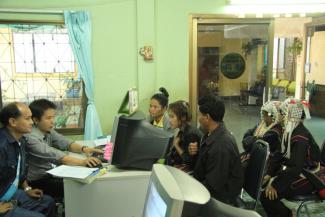Inequality
Redistributing money and power

Oxfam, the international non-governmental organisation (NGO), estimates that 70 % of the world population live in countries where the gap between rich and poor has grown over the past 30 years. Developing countries, emerging markets and industrial countries are equally affected. According to Oxfam, rising disparities of income and wealth are among the biggest global challenges in economic, social and political terms. Even the business-dominated World Economic Forum sees income disparity as a key risk in the next decade.
Economic inequality affects many areas of life, including life expectancy, education opportunities and health. According to Oxfam, it reinforces other inequalities such as those owed to gender, ethnicity or religion. In countries with growing income gaps, crime and violent conflicts are to increase too. Contrary to former beliefs, inequality hampers economic growth and its effects on reducing poverty, the NGO states.
The global community has acknowledged the problem. Reducing inequality is one of the Sustainable Development Goals (SDGs) that the UN adopted in 2015. Accordingly, money and power must radically be redistributed, Oxfam argues. “Governments can close the gap between poor and rich if they break away from pure belief in the market and confront the interests of powerful elites,” the NGO states in a recent update of the summary of its 2014 report „Even it up – time to end extreme inequality“. Redistribution is the only way to create equal chances for all, it argues.
Oxfam is calling for concerted action to build a fairer economic and political system that will value every citizen’s rights. Policies must be implemented concerning regulation and taxation, minimum wages, social transfers and free access to the education and health-care systems, for instance.
The report identifies international tax loopholes as a major problem. Developing countries lose at least $ 100 billion per year due to multinational corporations’ tax avoidance and evasion (see article in D+C/E+Z e-Paper 2017/03). The practice costs Bangladesh alone $ 310 million every year – enough to finance a fifth of the country’s overall expenditure on primary education.
Ensuring equal opportunities for women is another essential issue. Gender inequality and income inequality are closely related. Studies have shown that, in highly unequal societies, girls are less likely to get higher education, parliaments have fewer female members and the income gap between men and women is bigger. In Ethiopia, for instance, the poorest women residing in the countryside are six times less likely to have ever gone to school than the richest male city dwellers.
Oxfam demands equal rights for men and women, for example in laws concerning inheritance and land ownership. Moreover, the NGO is in favour of a fairer division of labour between the sexes. It also wants unpaid care work to be paid.
Most people all over the world reject strong inequality as unfair, unethical and harmful for society, as surveys show. Current debate on excessive manager salaries in Germany and Europe are a sign of such awareness, and so is criticism of corrupt “elites” who are enriching themselves worldwide. According to Oxfam, governments should listen to their people and exercise more control and regulation to reverse the trend towards growing inequality.
Link
Oxfam, 2014: Even it up – time to end extreme inequality.
https://www.oxfam.de/system/files/20141029-even-it-up-extreme-inequality.pdf











